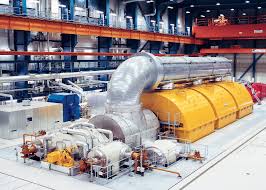Cooling system should be provided in the generator or alternator to remove the heat generated in the windings (I2R loss) of the generator. Inability to remove the heat results in damage to the winding insulation of the generator and can lead to reduction in the life span of the generator. Natural air cooling and forced air cooling is provided for the small rating generators.
However for the generators rated above 60MW the amount heat generated will be enormous and air cooling is insufficient to cool the generator. Therefore hydrogen cooling is employed to remove the heat generated. Hydrogen cooling is chosen because of few characteristics of the hydrogen gas. Along with hydrogen cooling water cooling is provided in the stator winding circuit for large generators
Advantages of Hydrogen cooling:
- The density of the hydrogen is 1/14th that of the air, the power required to circulate hydrogen (pumping capacity) is about 1/14th of the power required for an equivalent quantity of air. Hence the losses are reduced and the efficiency of the machine is improved by about 1% of the full load power of the machine. For example consider 500MW generator, the amount of energy saving constitutes almost 5MW which is a much more power
- Hydrogen has specific heat 14 times, heat transfer coefficient 1.5 times and thermal conductivity 7 times that of the air. So it has excellent heat carrying capacity compared to air. A generator using hydrogen as a coolant may be rated about 20% higher than the same physical size using the air
- The life of the generator is decided by the life of the winding insulation. By using hydrogen cooling which has better heat transfer coefficient, life of winding insulation increases resulting in the more life of the generator
- Smaller size of heat exchanger/cooler is required to cool the heated hydrogen










